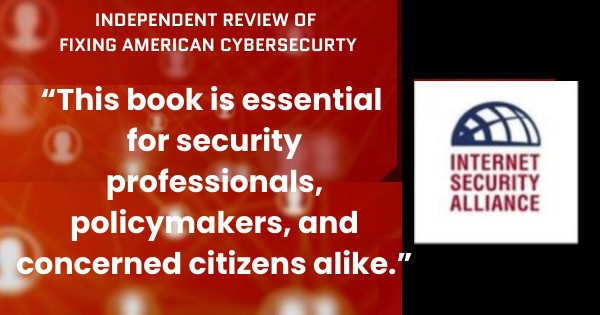A Review of Fixing American Cybersecurity, Edited by Larry Clinton and Foreword by Kiersten Todt
This entry was posted in Book ReviewCybersecurity on March 30, 2023 by Steven Bowcut
In an era of growing cyber threats and increasing data breaches, the need for robust cybersecurity measures has never been greater. Against this backdrop, Larry Clinton’s new book, “Fixing American Cybersecurity: Creating a Strategic Public-Private Partnership,” offers a timely exploration of the challenges and solutions involved in securing our digital infrastructure. It provides a comprehensive overview of the most critical vulnerabilities that our nation faces today and offers a refreshing take on contemporary American cyber policy.
The book is a collaborative effort of the Board of Directors of the Internet Security Alliance, which Larry Clinton himself heads. Drawing on the extensive experience of an elite group of professionals in the cybersecurity field, the book makes a compelling case for why cybersecurity must be treated as a national priority and provides a roadmap for achieving this goal. This article reviews this critical book, highlighting its key insights and takeaways.
The book focuses on securing cyberspace and which tactics are working best. It also reveals the need for economic and market incentives to create secure products. This lack of incentives has been one of the primary reasons for America’s failure to protect its citizens from cyber threats adequately. The authors provide an in-depth analysis of why this is so and offer solutions for how to fix it.
One of the book’s key strengths is its framework for understanding cybersecurity challenges in the context of national security. Clinton argues that cybersecurity must be seen as an integral component of our national defense, just like counterterrorism, and must be given the same level of attention and resources. This entails crafting a comprehensive national cybersecurity strategy that takes a holistic approach to defending against cyber threats, emphasizing deterrence, resilience, and international cooperation. Clinton provides relevant case studies in a variety of vertical industries.
Another critical theme in the book is the role of partnerships in cybersecurity. Clinton emphasizes that government, the private sector, and civil society must all work together to ensure adequate cybersecurity outcomes. This includes fostering information sharing, building trust, and developing shared standards and best practices. The book provides numerous examples of how such partnerships have been successful in past cases and stresses the need to expand and deepen such collaborations in the future.
The book is also notable for its actionable recommendations for shoring up cybersecurity at all levels, from the national to the organizational. Clinton highlights the need to invest in cybersecurity training and education for all stakeholders, from board members to employees. He also advocates for increased participation in information-sharing forums, crucial conduits for sharing threat intelligence and best practices. In addition, Clinton highlights how US-China relations and COVID-19 have helped shape today’s threats and should be considered in any cybersecurity policy decision from now on.
In addition, Fixing American Cybersecurity provides valuable insight into how public-private partnerships can be used to improve cybersecurity. It explains how these partnerships can help create more effective security measures while providing economic benefits for both parties.
Finally, we should mention the book’s sobering claims about the current state of cybersecurity readiness in the United States. Clinton offers a stark indictment of existing policies and practices and argues that urgent action is needed to fix the nation’s cybersecurity vulnerabilities. While some may find the book’s assessment overly pessimistic, its overall message is important – that cybersecurity must be taken much more seriously to avoid the dire consequences of a significant cyber incident.
Larry Clinton’s “Fixing American Cybersecurity” offers a cogent and timely exploration of the challenges and opportunities involved in securing our digital infrastructure. With the prevalence of cyber threats on the rise, the book offers a vital perspective on how cybersecurity must be seen as a critical component of national defense. The book’s key takeaway is that cybersecurity requires a comprehensive and collaborative approach, with all stakeholders working together to develop a shared strategy for securing our online world. While the book paints a sobering picture of our current cybersecurity landscape, it offers valuable recommendations for improving our defenses and mitigating future risks. This book is essential for security professionals, policymakers, and concerned citizens alike.
Steven Bowcut, Brilliance Security Magazine review:
